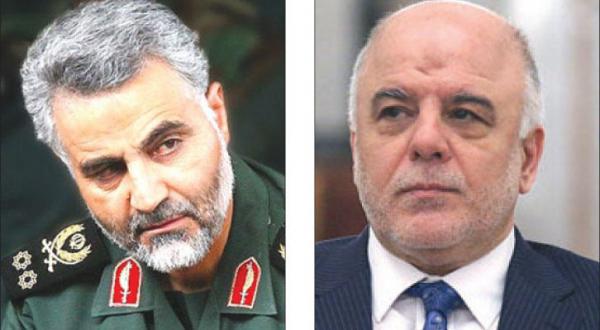Baghdad- Iraqi official told Asharq Al-Awsat that Iran has delegated the Commander of Iran’s al-Quds Force and the responsible for the Iraqi file, Brigade Qasem Soleimani, to Baghdad in line with the political and economic reforms that the Iraqi Prime Minister Haider al-Abadi is planning to implement.
The officer, who preferred to remain anonymous, said that al-Abadi succeeded in his latest battle in the parliament on Saturday in what he described as a “substantial reshuffle” through the reformation of a “Technocrat” government.
The source added that Soleimani is in Baghdad now to adjust the balances of the Shiite house and prevent it from collapsing. Soleimani’s visit came after receiving news on the conflicts between Shiite leaders and Haider al-Abadi stirred by the assignment of new members in the Popular Mobilization Forces militias and their intention to demobilize about 30 percent of their members due to the financial crisis hitting Iraq in general and PMF in particular.
The officer said that al-Abadi requested help from different political blocs to choose a harmonious ministerial team; thus putting more pressure on these blocs and embarrassing them in face of their religious reference, specifically the Shiite parties. He also said that Iran has introduced itself to the new ideas adopted by al-Abadi, especially after noticing that the major opponents for Abadi’s ideas are from the Shiite House, including the Sadrist Movement, which is led by Muqtada al-Sadr, and the Islamic Supreme Council, led by Ammar al-Hakim.
In his interview with Asharq Al-Awsat, the source revealed that Soleimani visited Iraq carrying three decisive messages with him. The first message is to inform the Iraqis that Iran supports al-Abadi, which means that whoever is hoping to replace al-Abadi from the Shiite House should reconsider, especially Nouri al-Maliki. The second message is to warn the Sadrist Movement and the Islamic Supreme Council from secession from the National Alliance. The third message Soleimani carried from Iran is to keep the leaders of the Popular Mobilization Forces from turning against al-Abadi, thus devoting his authority as a commander in chief for the armed forces.

